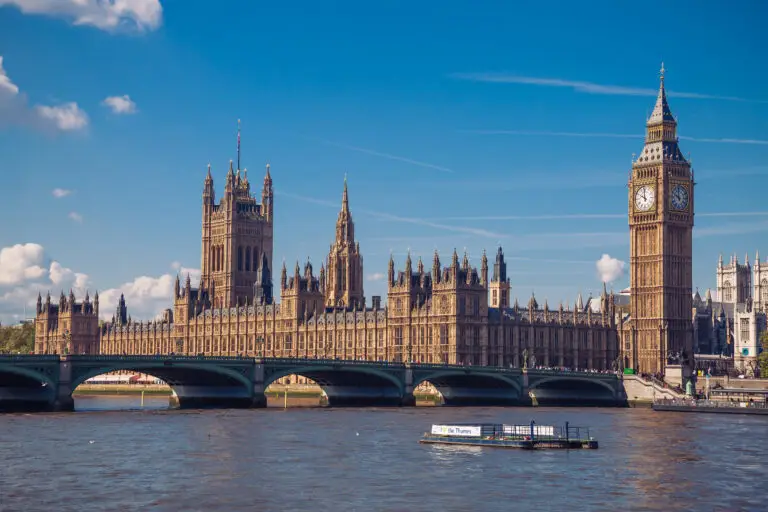As PLMR is preparing for the return from parliamentary recess on Monday (8 January) and a huge year ahead, we have taken a moment to reflect on the year gone by. Here are five of the most significant political developments that impacted UK politics in 2023:
-
Revolving door reshuffles
Multiple cabinet and shadow cabinet reshuffles in 2023 provided the backdrop for much of the political gossip and an indication of which direction the Prime Minister was taking the Conservative Party. Most significantly, November saw Home Secretary, Suella Braverman, leave the cabinet and the return of former PM, David Cameron to the Cabinet as Foreign Secretary. The reshuffle indicated a reassertion of authority for Rishi Sunak after murmurs of his leadership being undermined by supporters of Braverman within the party, repositioning the Conservatives once again as pragmatists and – in theory at least – a safe pair of hands for the next election.
Among the opposition, the most significant shadow cabinet changes of the year included Deputy Leader Angela Rayner MP taking on the additional position of Shadow Secretary of State for Levelling Up, Housing and Communities and behind the scenes, the experienced Whitehall operator Sue Gray become Keir Starmer’s Chief of Staff.
-
Inflation and economic pressures
In the year that was, the economy and inflation were a key backdrop to the political debate. Overall, the UK economy performed better than expected in 2023, having grown 0.5% rather than seeing GDP falling by the predicted 1%. Boosts in tax revenue also meant that the Chancellor, Jeremy Hunt, was able to deliver reductions in the amount of national insurance the average household pays.
Despite this, inflation rates have been stubbornly high, and the benefits from Hunt’s tax cuts (coming into force on 6 January 2024) are yet to be felt by many households who continue to face financial pressure. The economy, therefore, will remain a primary focus of the Government in the year ahead and a key battleground for all parties in the lead up to the looming general election.
-
Leadership of the devolved nations
2023 saw the resignations of two influential First Ministers in the devolved administrations in Scotland and Wales.
Having led Scotland for the best part of a decade through multiple elections, Nicola Sturgeon’s resignation came after immense pressure around public service strikes and over the Scottish government’s devolutionary authority to deliver on the Gender Recognition Reform (Scotland) Bill. Sturgeon’s record was later tarnished due to her brief arrest and an ongoing investigation into the funding of the SNP.
Meanwhile, having fulfilled his commitment to serve as First Minister of Wales for five years, Mark Drakeford’s resignation was less surprising. Drakeford has overseen a largely progressive government, though his tenure has been marred by recent controversies over the 20mph speed limit change in residential areas in Wales and difficult personal circumstances following the death of his wife a year ago. A leadership election for Drakeford’s replacement will commence in February 2024, with the new Labour leader expected to be announced by March.
-
Rwanda and immigration
The controversial Rwanda Bill continued to cause issues for Rishi Sunak throughout the year, with various legal challenges from the Supreme Court questioning the legality of the Bill. Although Sunak was able to end the year by passing the Safety of Rwanda (Asylum and Immigration) Bill through its first stage of voting in the House of Commons following the abstention of Conservatives on the right of the party, marking a positive step forward for the PM. The Bill is expected, however, to be heavily amended as Parliament returns to recess which could stoke further divisions between One Nation Conservatives and a plethora of new Conservative MP groupings on the right, who are calling for tougher provisions to be included within the Bill.
-
Labour’s by-election successes
In October, Labour secured three by-election victories, marking progress for the party since its historic defeat in the 2019 general election and contributing to a wider narrative about Labour’s trajectory for an impending election in 2024. Most notably, Labour overturned a 24-000 vote majority in Mid-Bedfordshire, which had been safely Conservative since its creation. Alongside this, Labour succeeded in turning over the seat of Rutherglen and Hamilton West from the SNP, indicating positive movement for Labour in Scotland whilst simultaneously creating a difficult start to Humza Yousaf’s tenure as First Minister. Labour also successfully overturned the seat of Tamworth, which had been in Conservative hands since 2010.
Starmer will be hoping to continue this momentum in the new year as the Wellingborough constituency is contested in a by-election, likely to be held in mid-February.





